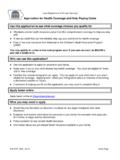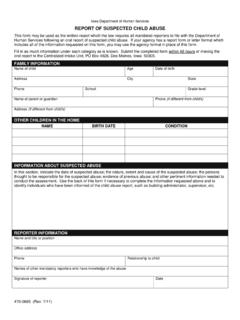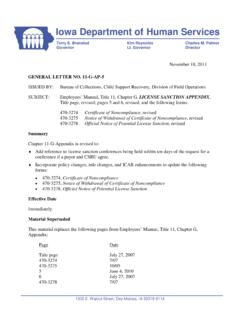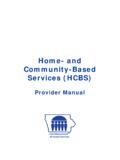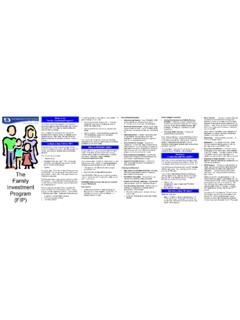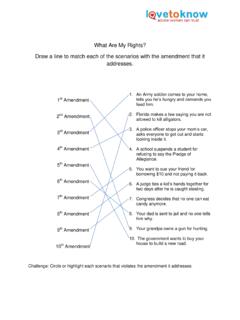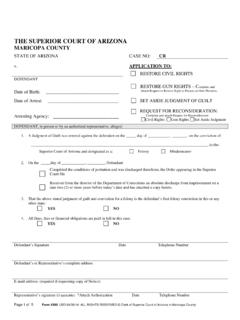Transcription of What Are My Rights? - Iowa Department of Human …
1 Please keep this page for your information. Comm. 233 (Rev. 2/20) Page 1 of 5 rights and Responsibilities When you get Medicaid from the Department of Human Services (DHS), you have the following rights and responsibilities. Note: Medicaid on this form means any DHS medical assistance program including Medicaid, Healthy and Well Kids in Iowa (Hawki), Iowa Health and Wellness Program (IHAWP), State Supplementary Assistance (SSA), and Refugee Medical Assistance (RMA). what Are My rights ? You have the right to: Apply for any program. File an application online, by phone, by mail, by fax, or in person at your county DHS office. Have someone help you apply. Have all of your questions answered.
2 Get information about the programs you applied for and any other DHS program that you may be able to get. Be sent a notice within 45 days of the day we get your application telling you if your application was approved. Have information about you and your family kept private as required by law. Have your expenses used to figure your eligibility or the amount of assistance you get by reporting your expenses, and giving proof if we ask you to. If you do not report or give proof of your expenses when asked, you choose not to claim the expense. You can report and give proof later to have an expense used for future months. Be treated equally without regard to race, color, national origin, sex, sexual orientation, gender identity, religion, age, disability, political belief, or veteran status.
3 If you feel we have discriminated against or harassed you, send a letter detailing your complaint to: DHS, Office of Human Resources, Hoover Building 1st Floor, 1305 E. Walnut, Des Moines IA 50319-0114 or via email at Appeal any decision you do not agree with by following the directions on the last page of this form. what Are My Responsibilities? You must tell us the truth. Section 1128B of the Social Security Act provides federal penalties for fraudulent acts and false reporting in connection with Medicaid programs. Anyone who gets, tries to get, or helps any other person get assistance to which they are not entitled, is guilty of violating the laws of the State of Iowa. This includes, but is not limited to, Iowa Code Chapters 249, 249A, 249N, and 514I.
4 Giving wrong information on purpose may result in us taking criminal or civil legal action against you. You will have to pay back any benefits paid in error for you or anyone you apply for. You may be liable for the full amount of any payments made, including payments made to the health and dental plan in which the person was enrolled. Please keep this page for your information. Comm. 233 (Rev. 2/20) Page 2 of 5 You must tell us within 10 days about any changes that may affect your eligibility. This includes changes such as: Mailing or living address. Starting or stopping a job or any other income (including lump sum payments, past due child support, inheritances, settlements, or cash medical support).
5 Someone moving in or out of your home. Resources or assets, including getting an inheritance. Changes in any other health insurance coverage (including employer-sponsored insurance, Medicare, etc.). Filing an insurance claim or getting an attorney to recover bills paid by Medicaid. To report a change: Call 1-877-347-5678, or Email or Fax information to 1-877-238-0015. You must apply for and accept any other benefits and medical assistance coverage that you may be able to get. You must give us information and give us proof when we ask for it. You must fill out review forms when you are asked to. You must cooperate with Quality Control (QC) and the Department of Inspections and Appeals (DIA).
6 They may contact other people or organizations to get proof of your information. By signing the application, you give permission to release confidential information to QC or DIA. If any child applying for or receiving Medicaid has a parent living outside the home, you must cooperate with the agency that collects medical support from an absent parent. If you think that cooperating to get medical support will harm you or your children, you can tell us and you may not have to cooperate. You must cooperate with the Health Insurance Premium Payment (HIPP) Program and enroll in a health plan through your employer, if we ask you to. Visit for explanation. You must agree to assign medical payments from a third party to the Medicaid agency for yourself and others who are eligible for Medicaid for whom you can legally assign benefits, cooperate in getting medical payments from third parties, give the Medicaid agency rights to pursue and get medical support from a spouse, and give the Medicaid agency rights to pursue and get money from other health insurance, legal settlements, or other third parties.
7 If you get money from another person or an insurance company to pay your medical bills, you must give that money to DHS if Medicaid paid the bill. This will be used to repay bills that Medicaid paid for you. This permission ends when your Medicaid stops. Please keep this page for your information. Comm. 233 (Rev. 2/20) Page 3 of 5 Other Things You Need to Know DHS will provide documents or claim forms describing the services paid by Medicaid upon your request or the request of an attorney acting on your behalf. Such documents may also be provided to a third party, when necessary, to establish the extent of the DHS s claim for reimbursement. If the State of Iowa was made the remainder beneficiary on an annuity in order for you to qualify for Medicaid payment of long-term care, the State of Iowa will get any benefits remaining in the annuity, up to the amount of the Medicaid benefits paid.
8 If you become enrolled in a managed health care plan, you consent to disclosure of medical information, including any clinical mental health or substance abuse information, by your medical providers to the PCP, other managed care providers, or to the authorized administrative body contracted by the managed care provider to determine appropriateness, quality, or utilization of services you received while enrolled in managed health care. A medical certification from the Iowa Medicaid Enterprise (IME) is needed for certain medical programs. Payments on any future unpaid medical services will be paid directly to the doctors and medical suppliers under the Medicare Insurance Program (Medicare Part B).
9 We Check what You Tell Us The information you give us may be checked by federal, state, and local officials to make sure it is true. Things we might check include any listed person s: social security number, job and pay, bank account amount, immigration or alien status, and amounts received from other sources like Social Security or unemployment. If any information you give us is not correct, we may ask you to send us proof or we may deny or cancel your benefits. We may check records from other states to see if any person in your household can get benefits in Iowa. This may be because a person was disqualified from a program in another state. As part of the eligibility determination process, we may need to retrieve your information from sources like the Internal Revenue Service (IRS), Social Security Administration (SSA), the Department of Homeland Security, Asset Verification System (AVS), and the state Income and Eligibility Verification System.
10 If something you told us is different from what the computer systems tells us, we will check to find out what is correct. We might check your information by contacting your employer, your bank, or other people. To do this kind of checking with your employer, bank, or other people, we will ask you first. Such information may affect your household s eligibility and level of benefits. The authorization to use AVS database is in effect for as long as the Department is determining eligibility, the individual is a Medicaid recipient, or the applicant or recipient revokes the authorization. If refusal or revocation of the authorization is submitted, the Department may, on that basis, determine the applicant or recipient ineligible for medical assistance.
